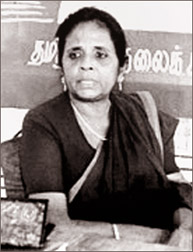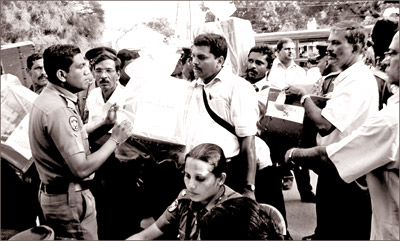Understanding Tamil politics
 Although the Local Government elections held in July confirmed the
ruling party’s firm hold on the Sri Lankan electorate, the government,
no doubt noticed the cloudy situation created by the majority of the
Tamil areas returning TNA candidates. Some political analyst however
drew solace from the results stating that the results were a testimony
of the free and fair nature of the elections and that they also proved
the exuberant nature of the Sri Lankan democracy. Yet those analysts,
however objectively optimistic they are, could not hide the reality that
the majority of the Tamils, after a bloody 35 year war of separatism
that wrecked their lives should still vote for a party that justified
and fanned the separatist ideology. Although the Local Government elections held in July confirmed the
ruling party’s firm hold on the Sri Lankan electorate, the government,
no doubt noticed the cloudy situation created by the majority of the
Tamil areas returning TNA candidates. Some political analyst however
drew solace from the results stating that the results were a testimony
of the free and fair nature of the elections and that they also proved
the exuberant nature of the Sri Lankan democracy. Yet those analysts,
however objectively optimistic they are, could not hide the reality that
the majority of the Tamils, after a bloody 35 year war of separatism
that wrecked their lives should still vote for a party that justified
and fanned the separatist ideology.
Tamil vote
|

Former Jaffna Mayor Sarojini Yogeswaran |
In Tamil areas the UPFA received a 25 percent of the vote but the UNP,
as usual, proved their position as a political force of no significance
in that area. While the performance of the UNP could be explained by how
they fared countrywide, the question is, could the government be
satisfied with the vote it had been able to garner for all the good work
it had accomplished in those areas? The government rescued the
beleaguered, demined the mined areas and resettled providing basics,
rehabilitated the youth, reconstructed the infrastructure and most of
all restored democracy in the North.
All that gigantic salvaging tasks in a relatively short time of two
years and hence the political reward it achieved for all that work needs
close scrutiny. It is not that the ruling party cannot lose elections
but the irony here is that the loss was to the political party that was
in some way responsible for enacting all that world wind for 35 years.
Do the people in Jaffna remember that the last elected Jaffna Mayor
Sarojini Yogeswaran was assassinated by the LTTE in 1998? How then, do
we analyze this position and decipher the factors that motivate the
Tamil vote?
Social order
One learned analyst while admitting that the results appeared
familiar recalled that they are synonymous with the results of the 1977
election where the UNP dominated the South while the TNA held the North.
He, however, fails to reason out beyond that because the paradox here is
that the situation in 1977, was far different from the situation in
2011. In 1977, there was a simmering political animosity between Mrs.
Gandhi and the Jayewardene government but today the relations are most
cordial. In 1977 the LTTE showed promise but today it is history. More
importantly, today most of those ‘grievances’ that were said to be the
causes of all that mayhem and polarization of 1977 have been affectively
addressed. How then, do we get the Tamil community to assimilate into
mainstream?
|

Local Government elections held in Jaffna upholds democratic
rights.
Picture by Nissanka Wijeratne |
The most probable explanation for this paradoxical situation was
presented by Sebastian Rasalingam writing to the Lanka Guardian from
Toronto, Canada. According to him the average Tamil man considers the
hierarchy in the caste - based Tamil society as important as being a
member of the Tamil community and hence any outside intrusion in to that
oligarchy is considered as a threat to the well-being of his community.
“Ask the wife of any upper class Periya Dorai and she will tell you that
the Tamil servants are better than the Sinhalese servants. Indeed most
working class Tamils are ‘Low Caste’ Tamil conforming to the Manu Dharma
in obeying the upper classes with a bowed head even when it is not in
their interest. This is the ‘slave mentality’ or depressed caste/class
mentality (DCM). The namptiri Brahmins (elite) have taught us that it is
all due to our past ‘Karma’. Unfortunately, the Pillai class Catholic
Bishops too have acquiesced to this conspiracy against humanity,”
maintains Mr. Rasalingam.
Language Bill
Further according to Rasaligam the acronyms TNA and TULF should more
appropriately stand for Thamil Naptiri Alliance and Thamil United
Landlord’s Front but the average Tamil patronizes these two
organizations with this structured social order in the name of
‘protecting the interest of his community’. He recalls how the
progressive legislation was blocked by the ITAK (present TNA) leadership
from 1949 latching on to political radicalization based on language and
Tamil nationalism. Education had been the privilege of the Vellala caste
in the Jaffna peninsular and it was the SWRD government that commenced
15 schools back in 1957 to cater to the educational needs of the
ordinary Tamil student.
Come to think of it, why should Chelvanayagam oppose the 1956
Language Bill as it was that Bill that gave the average Tamil student
the right to receive his education in his mother tongue for the first
time in the known history of Sri Lanka. Up to then, 1956, only six
percent of the Sri Lankan population was conversant in English and that
should mean that the majority of the Tamils as well as the Sinhalese
received no education at the time.
It is a fact that the caste structure runs deep in the Tamil society
and thus Tamil psyche takes that social order for granted. Therefore,
any attempt to introduce progressive reforms that may run contrary to
those deep-seated norms could easily be interpreted as being
‘discriminatory’ towards Tamil ethos. This is quite evident when you
analyze the recent history of Tamil politics in Sri Lanka as right from
the introduction of the universal franchise in 1931, through Swabasha
education to free education, all the progressive reforms were ostracized
as ‘discriminatory’ and therefore were opposed by the Tamil elite
leadership.
Rasalingam therefore suggest that in resettling the displaced Tamils,
the government should have introduced land reforms in those areas first
as a way of liberating the ordinary Tamils from the clutches of their ‘saviours’.
Rasalingam could be right; we need some new thinking to make the
members of the Ceylon Tamil community feel that they are Sri Lankans
first.
[email protected] |



